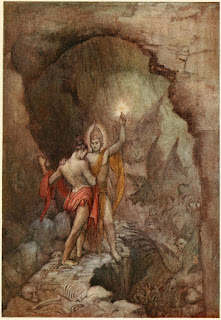Reading Notes: PDE Mahabharata, Part D
For this section, I again decided to use bullet points. I think that they really helped me organize my thoughts on the last post, and I found it a bit easier to navigate the notes. I think that I mostly use the reading notes to decide what I want to write about in upcoming weeks, and bullet points help me focus on particular stories and parts of the plot that I liked.
- First of all, I liked how the story immediately picked up with the battle. Although the descriptions were pretty gruesome, I liked how they used very descriptive adjectives. It really helped me picture the scene. For example, "many were slain, and rivers of blood laid down the dust; horses writhed in agony, and the air was filled with the shrieking and moaning of wounded men. Terrible were the omens, for headless men rose up and fought one another."
- Another section that reads like the one above was, "blood dropped like rain out of heaven, while jackals howled impatiently, and kites and vultures screamed hungrily for human flesh."
- The families in this story are very loyal to one another. I felt like this wasn't really true for the families in the Ramayana, as they often sent each other away.
- The first part focused a lot on the battle scenes, but I liked that it was really the only important battle. It provided a climax in the story that was very exciting.
- One thing that I didn't think was very satisfying, but it did contribute to the story was the fact that pretty much everyone died at the end of the story. They each had very different ways of dying, but like the story said, "many fell on that awful night."
- I thought it was interesting how closely some of these scenes resembled scenes from the works of Homer, as it said in the author's note. Additionally, I liked the powers that Duryodhana had, as I enjoy the added supernatural element.
- I felt sad for all of the wives and mothers of the fallen soldiers, and I think that adding an emotional element into a story, such as this one, can make it a lot stronger.
- I also wanted to note the use of Parvati in this story, as I am doing my project over different versions of the goddess Kali.
- I liked the use of the ritual to become king, which was something that you don't really see in stories, but it added another element that I could potentially use for a story in the future.
- One of my favorite titles was "the forest and the ghosts"
- I was also kind of sad when Krishna died, as pretty much everyone ended up dying, but I thought it was interesting how the story ended with "the afterlife." This was very similar to the Ramayana. Overall, I liked this story a bit more than the Ramayana, but I got a little bit confused about all the characters and kind of lost track of some of them.
Reference. PDE Mahabharata by Arnold, Besant, Devee, Dutt, Ganguli, Kincaid, Macfie, Mackenzie, Nivedita, Seeger, and Tagore., from SOURCE.



Comments
Post a Comment